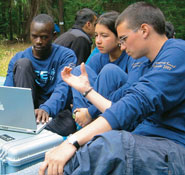

|
|
|
|
|
|
FEATURES:
• The News about Neutrinos |
 A Culture Quest — on Film R/TV/F sophomore Chris Browne learned much about environmental awareness last summer while making documentaries on Vancouver Island.  Clayoquot Sound — an array of misty islands, lush estuaries, towering forests and sandy beaches on the west coast of Canada’s Vancouver Island — would make the perfect setting for any film.
Clayoquot Sound — an array of misty islands, lush estuaries, towering forests and sandy beaches on the west coast of Canada’s Vancouver Island — would make the perfect setting for any film.
Last July sophomore Chris Browne was one of 12 aspiring young filmmakers from around the world who camped on Clayoquot Sound to soak up the scenery, learn about a new culture and shoot documentaries. The opportunity came about through Leadership Initiative for Earth, a Vancouver-based organization that promotes efficient use of the earth and its resources. The organization’s summer program, called LIFEquest, sent the travelers on the monthlong expedition. Browne, a radio-television-film major and nature enthusiast from Flossmoor, Ill., saw the experience as the best of both worlds. “I was incredibly excited,” he says. “My goal going in was to learn a little about film and a whole lot about nature. “The first day as we were landing we saw a gorgeous mist spreading over these green trees,” he recalls. “A baby whale and its mother came by. They were swimming so close to the boat I could have jumped out and ridden on their backs. No matter where you looked, there was life, a density and a beauty that you just can’t see around my part of the country.” To be sure, it wasn’t an easy time. A typical day started at 7 in the morning, when one person would start a fire. Breakfast — almost always dry cereal and hot chocolate or coffee — preceded one of two things: shooting new footage or editing existing film. After lunch it was back to the outdoors to finish the day’s work. Nights were spent repairing tents or sitting around a fire and talking. Shooting and editing were no breeze either, as high-tech, titanium laptop computers were undermined by nightmarish weather (the area is famous for its storms and can get 120 inches of rain a year) and the primitive conditions. “It started out slowly,” says Browne, “but we came out with really professional-looking stuff.” Though the breathtaking landscapes were inspiring enough, they served only as the backdrop for the more important subject of the group’s videos: the land’s indigenous inhabitants. Browne describes the Nuu-chah-nulth nation as “an incredibly giving and community-oriented people.” In addition to their hospitality, he discovered a people who are masters of what is called sustainable development, the capacity to meet present needs without compromising the ability of future generations to meet their own needs. One of Browne’s two short films from the experience focuses on 88-year-old Merve Wilkinson, who, by practicing “selective forestry,” carefully cuts down trees in a manner that promotes the health of the remaining wilderness. Browne also filmed oyster farming, which actually engenders a more dense and diverse ocean population by creating artificial reefs. Ecotourism, too, such as whale watching or canoe trips, entered into his sustainable development mix. Browne describes his second film as an “introspective video, basically a call for people to regain their curiosity and see the world through a child’s eyes. “I tried to make it as positive as possible,” says Browne of the video, which contains shots of misty mountains, a starfish floating on its back and ants building in the forest. All are zoomed in 120 times so that even the smallest detail, like the starfish’s tiny neon feet, appears vividly. Aside from the natural beauty that surrounded him, Browne, the only U.S. citizen of the group — which included students from Kenya, Argentina and Turkey, among other countries — saw the month as an opportunity for interpersonal discovery. “I got to know these people during the first week, and after that we were like old friends,” he says. “So now I can say I know somebody in Turkey, I know somebody in Bosnia and Herzegovina. They’re close friends now, and that’s important to me.” — Michael DePilla (J04) |